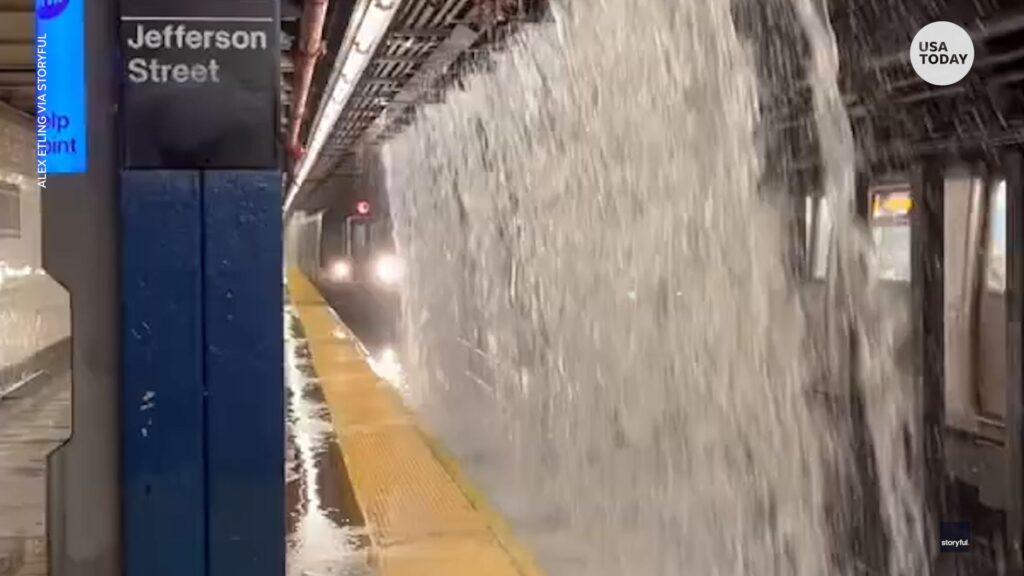Wednesday
Last week, as I was watching news reports of Hurricane Ida hammering the east coast, one image in particular caught my attention: New York’s subway system filling with water. In Haruki Murakami’s novel 1Q84, a supernatural squall, triggered by the anger of “the Little People” (more on them in a moment) submerges a Tokyo subway station. Hang on while I apply the novel to the current climate crisis.
Aomame, a female fitness instructor who assassinates men who batter women, has just killed the cult leader of a fanatical sect who rapes little girls. Because the leader is the conduit for dark supernatural forces, embodied in a mysterious group of dwarfs, those dwarfs erupt in one last spasm of anger. Their target is the subway station where Aomame has stored her getaway bag. She is on her way there when she hears about the torrential downpour:
“Wasn’t that thunder something?” the driver said. “And the rain was incredible.”
And further on:
I hear the water in the streets overflowed and ran down into the Akasaka-Mitsuke subway station onto the tracks. It was because the rain all fell in one small area. They stopped the Ginza Line and the Marunouchi Line. I heard it on the radio news.
Aomame realizes that the Little People are trying to thwart her plans to escape. She barely manages to get her bag and get to her safe house before the cult is on her track.
The Little People, we learn, are behind the rage that leads men to batter women—and indeed, they are behind the deaths of Aomame’s two closest female friends. Once the cult loses their leader, they also lose touch with the Little People, which drives their search. As the leader explains to Aomame before she kills him, “the organization that I have created will never leave you alone…[T]hey will track you down and punish you severely. That is the kind of system that we have created: close-knit, violent, and irreversible.”
Murakami undoubtedly is basing the organization on Aleph, a Japanese doomsday cult and terrorist organization that carried out the deadly Tokyo subway sarin attack in 1995. In Underground: The Tokyo Gas Attack and the Japanese Psyche, Murakami interviewed members of the cult and came to see them as expressions of a deep frustration with Japan’s materialistic society.
With the election of Donald Trump, America saw the rise of the largest cult in its history, and the fact that this cult is denying climate change, even as we witness increasing numbers of extreme weather events (including Hurricane Ida), makes Murakami’s novel relevant to our current situation. Although America has become more enlightened in certain areas—we elected a Black president, our scientists came up with a Covid cure, we can track the impact of our hydrocarbons—it has also become prey to dangerous conspiracy theories. As the leader explains about such a dichotomy,
Where there is light, there must be shadow, and where there is shadow there must be light. There is no shadow without light and no light without shadow. Karl Jung said this about “the shadow” in one of his books: “It is as evil as we are positive…the more desperately we try to be good and wonderful and perfect, the more the Shadow develops a definite will to be black and evil and destructive….The fact is that if one tries beyond one’s capacy to be perfect, , the Shadow descends to hell and becomes the devil.
And further:
We do not know if the so-called Little People are good or evil. This is, in a sense, something that surpasses our understanding and our definitions. We have lived with them since long, long ago—from a time before good and evil even existed, when people’s minds were still benighted.
But the leader then gives us reason to hope:
But the important thing is that, whether they are good or evil, light or shadow, whenever they begin to exert their power, a compensatory force comes into being.
In the case of 1Q84, the final compensatory force is Aomame’s love for Tengo, the novel’s other protagonist, as well the child they will have together. The cult wants that child, sensing it can be the new conduit for the voices, but Aomame and Tengo’s relationship proves to be more powerful than the forces of destruction.
So what will it be for our environment? Will the rage of the Little People prevail? Or will love, for each other and for the earth, win out?


